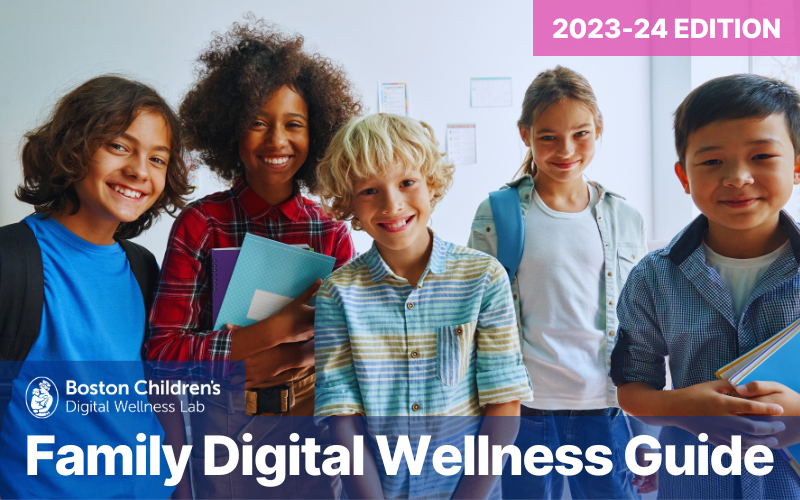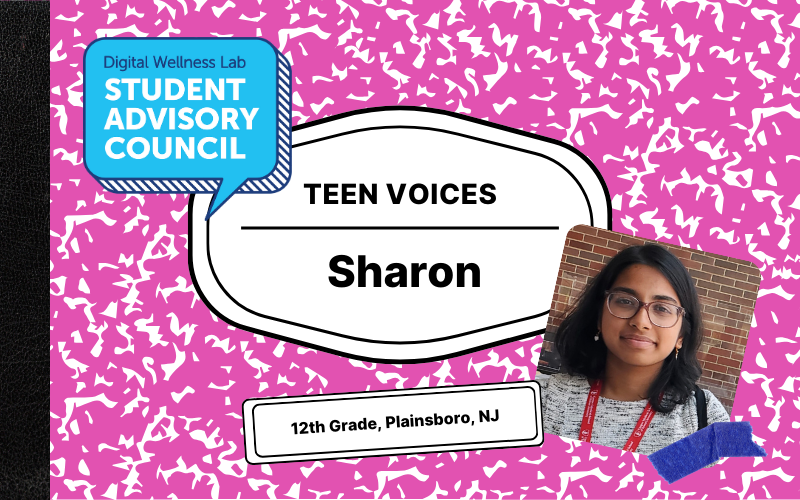Sharon is a member of the Digital Wellness Lab’s 2023-24 Student Advisory Council. She shares what adults don’t understand about teens and the impact of social media on their lives, stressing that not all teens are the same.
What does a “day in the life” look like for you with using technology and digital media?
As a high school senior, being on a screen for at least 5-6 hours a day is a must. Most of my school work is online on platforms such as Google Classroom, Gmail, and more. Especially due to the college application process, I spend many more hours a week using my computer to research universities, draft applications, and send emails. However, each time I log onto my computer, I am greeted by hundreds of emails, notifications, and Google calendar reminders that demand more of my time and attention, leaving me feeling overwhelmed. Apart from school, I spend around 1-2 hours a day on various forms of social media, mainly Youtube, and television but I often feel more drained out after the fact, encouraging me to limit the amount of free time I spend on these apps.
What are your favorite platforms/apps and why?
The Notes app, Spotify, Youtube — great for productivity, music, and funny videos, respectively
What are the greatest opportunities you see for teens when it comes to using technology?
Connection: Technology has expanded our ability to connect at levels unmatched by humanity before. In just a few minutes, we have the power to reach millions of people on social media. Consequently, we each have a real ability to make an impact in this world as exemplified by the protests of Greta Thunberg that were shared online to raise awareness for climate change or funny cat videos that touch the hearts of many.
Education: With just access to the internet and a computer, our potential to learn is limitless. There are millions of free videos, textbooks, and content online to learn anything, from a new instrument to multivariable calculus.
“It is far from healthy for the teenage brain to receive so much data to compare ourselves with, which may ultimately lead to a plethora of self-esteem and self-image issues.”
What are the greatest challenges you see for teens when it comes to using technology?
The digital world: Aware of the health impacts increased screen time can have on my health, including increased risk of heart disease and musculoskeletal issues, I feel the injustice of a system where I and many others are forced to interact with screens to accomplish our tasks. For instance, most of my school assignments are on the computer and I feel I must have social media to feel connected with my peers. This global digitalization is highly dangerous to not only me, but millions of students around the world.
Comparison culture: As soon as we enter an app, we are faced with pictures of friends doing things without us, posts that have more likes and comments than we ever get, and a soul-digging feeling that everyone seems to be living a life better than ours. It is far from healthy for the teenage brain to receive so much data to compare ourselves with, which may ultimately lead to a plethora of self-esteem and self-image issues.
What are the greatest opportunities you have and challenges you personally face when it comes to managing your technology use?
Recently, I had a difficult time navigating and setting boundaries for myself on social media during the Israel–Hamas war. Although I approached the media intending to feel happy and find joy, I was met with gruesome and triggering videos, images, and posts. With no intention to do so, I was exposed to images of dead children wrapped in bloody blankets, videos of war, and other content, leaving me feeling drained and emotional. I felt frustrated — When did I consent to being exposed to this media? How come these videos are accessible to minors? Where are the trigger warnings? This content has the potential to pose very real, very serious emotional harm to not only children and teenagers, but all those who are unwillingly exposed to it.
What would you want to see changed or redesigned for technology and/or media to be healthier for teens?
From the moment we turn on our phones, the digital landscapes have been carefully designed by experts with one goal: to keep us on the screen for as long as possible. Let’s take Instagram, for example. Emerging as one of the most popular social media platforms with the new generation, Instagram is widely successful. When we enter the app, we are greeted with bright colors on easy-to-navigate platforms. You can watch the stories of your friends (which have been carefully designed to disappear after 24 hours to encourage coming back to the app often), mindlessly scroll in the reels section (which is constantly collecting user data to determine what type of content we enjoy), and much more.
For the human mind, our dopamine levels reach a high due to the pleasure-inducing process of viewing short, enjoyable content, and thus we feel we must keep interacting with the app. As the population of the younger demographic interacting with the app increases, we must consider the safety and time of our children by regulating the level of addictiveness. Regulation can occur through a third-party group of experts evaluating the app, conducting studies, and undergoing proper clinical and behavioral evaluations before releasing it to the general public. By doing so, we are working together as humanity to promote the well-being and health of our future generation over the financial benefits of a select few CEOs.
“A healthy relationship on social media has different meanings for different people. Some teenagers feel the happiest when they spend much of their time on social media — scrolling and updating their feed, connecting with their peers on messages, and living the “digital life”. For others, like me, technology is draining.”
What, if anything, do you think parents and caregivers are missing when it comes to understanding how teens use media?
A healthy relationship on social media has different meanings for different people. Some teenagers feel the happiest when they spend much of their time on social media — scrolling and updating their feed, connecting with their peers on messages, and living the “digital life”. For others, like me, technology is draining. I feel most peaceful away from my computer, television, phone, and all other platforms that demand my attention. Many parents and caregivers may feel that the latter type of teenager is more happy, when this may not be true. It is imperative, therefore, to have conversations with your teen and encourage them to reflect on their experience with media: Why do you use different forms of media? How do the interactions make you feel? Is social media a source of happiness? Stress? Both? I encourage parents/caregivers to show their children that you trust them and value their experiences while sharing your own perspectives as well.
What guidance or advice do you have for parents and other caregivers to help teens to build and maintain healthy behaviors around digital media and technology?
Be the example! If you would like your teenager to talk to you more about their media experience, tell them about yours! If you would like them to put away their phone for dinner, do the same! If you would like them to set boundaries to their media usage, show them how you do it!
Sharon is a member of the Digital Wellness Lab’s 2023-24 Student Advisory Council. She is a high school senior in Plainsboro, New Jersey.






